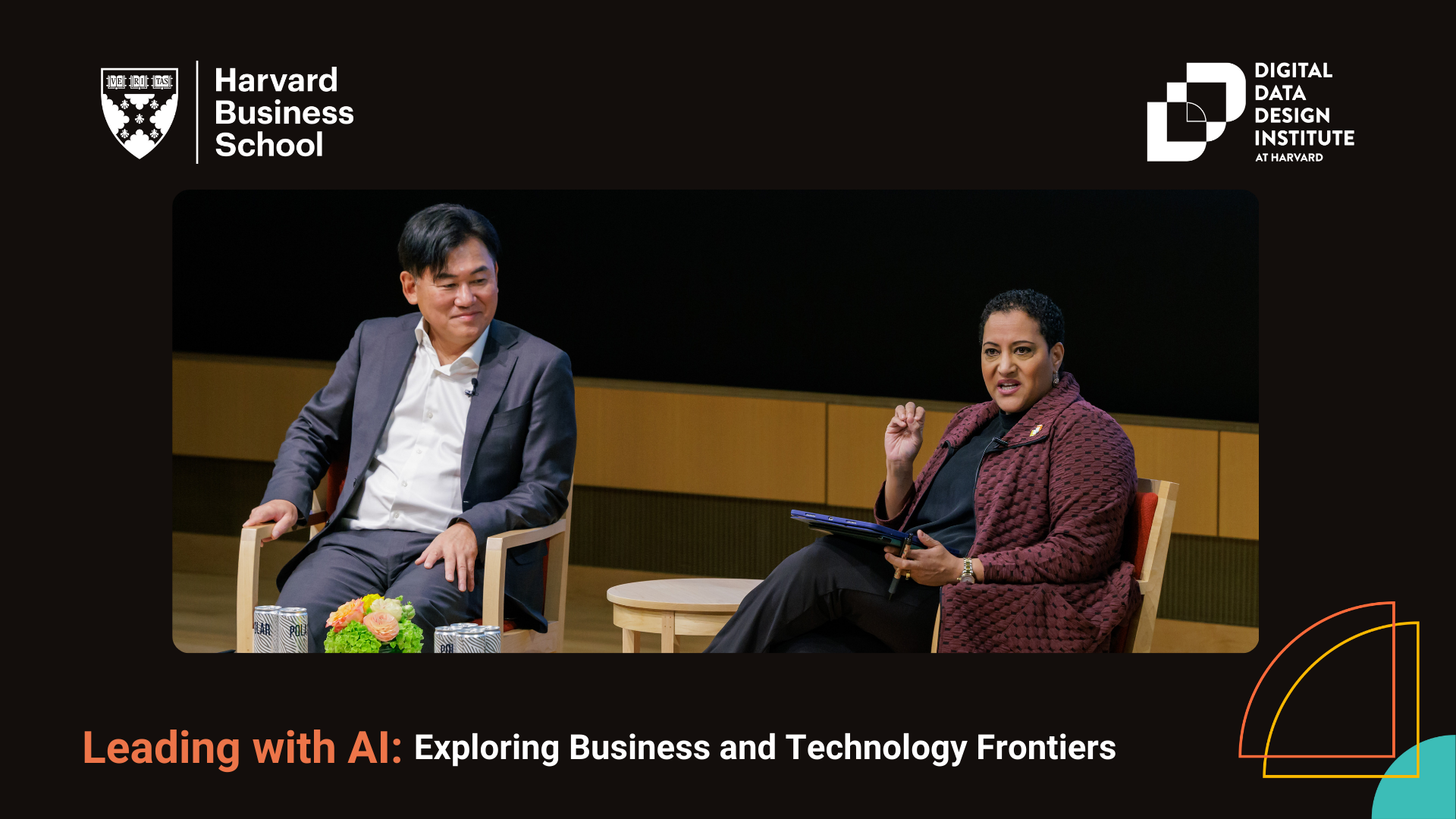On May 7, the Digital Data Design Institute at Harvard hosted Leading with AI: Exploring Business and Technology Frontiers. The conference featured a one-on-one conversation between Tsedal Neeley, the Naylor Fitzhugh Professor of Business Administration at Harvard Business School, and Hiroshi (Mickey) Mikitani, the founder, chairman, and CEO of Rakuten Group, Inc. Mikitani and Neeley discussed how Rakuten is using “AI-nization” to develop its business and employees and improve the customer experience.
Key Insight: Connecting and Organizing Data
“…the power of the internet is not about high speed, it’s about how you can connect the data.”
Mikitani
Rakuten was founded as an internet business when no one was buying on the internet. To Mikitani, the power of the internet is connecting data all over the world. Across its 70 businesses, Rakuten combines transaction data, financial data, travel data, and mobility data to create “Customer DNA,” or CDNA. With this massive amount of data, organizing the data is vitally important, and AI is a powerful tool that helps them do that.
Key Insight: Customer Ecosystem
“…maybe it’s not just about economics, it’s maybe the fun of accumulating some value…so we create a currency which we can connect one business to another.”
Mikitani
Mikitani spoke at length about creating a membership ecosystem that enables customers to use Rakuten Rewards program points to access new and different Rakuten services worldwide. Getting customer “brain share” doesn’t require a massive service like Google or Amazon, and it’s not necessarily about convenience and efficiency. It’s about helping customers find bargains on different products and making shopping fun.
Key Insight: Ai-nization
“Now, 60-70% of the content we share in the Monday morning meeting is about AI, so not only this management level of the people can learn, but also every single [person] in our group can learn across different businesses.”
Mikitani
Like the 2014 company initiative, “Englishnization,” Rakuten is now embarking on “AI-nization,” which describes the process of using AI as much as possible across the ecosystem. Using continuous learning, employee training, and partnerships where needed (with OpenAI and Google), Rakuten is creating their own generative AI to develop products and grow the business, with the goal of “Triple 20” — 20% improvements in operational efficiency, marketing efficiency, and merchant empowerment.
Key Insight: The Human Element
“…[we need to go] through the painful process to change a process…and we need to be sure we do not violate human rights and copyrights, so we need to educate our employees. It’s a very powerful tool, but at the same time, you need to be very careful about the ethical and legal part of it.”
Mikitani
Mikitani reflected on the human side of AI-nization, describing AI as a “copilot” with humans. He emphasized using AI to become more “hospitable,” to help people producing products by respecting them and empowering them, rather than “abusing data to destroy the business.” However, he also believes that some common traditional frameworks are holding us back, and we must have the courage to invent a “new future” with AI.
Key Applications
“Whether you like it or not, [AI] is coming. This is going to be the calculator, or Excel sheet, or PowerPoint in the future.”
Mikitani
- Develop a concrete approach of deploying AI.
- Get buy-in from employees, at both staff and professional levels.
- Provide basic education on AI to your entire staff.
- Learn where and how AI is becoming more efficient and use it as much as possible to experience it and see what it does.
Meet the Speakers

Tsedal Neeley is the Naylor Fitzhugh Professor of Business Administration, Senior Associate Dean of Faculty Development and Research Strategy, and Faculty Chair of the Christensen Center for Teaching and Learning at the Harvard Business School. Her work focuses on how leaders can scale their organizations by developing and implementing global and digital strategies. Tsedal received her PhD from Stanford University in Management Science and Engineering, specializing in Work, Technology and Organizations.

Hiroshi (Mickey) Mikitani is the founder, chairman, and CEO of Rakuten Group, Inc. He founded Rakuten with the mission to contribute to society by creating value through innovation and entrepreneurship. Since 1997, the company has grown into one of the world’s leading internet services companies with 70 businesses worldwide. Mikitani was educated at Hitotsubashi University in Tokyo and earned his MBA at Harvard Business School.
